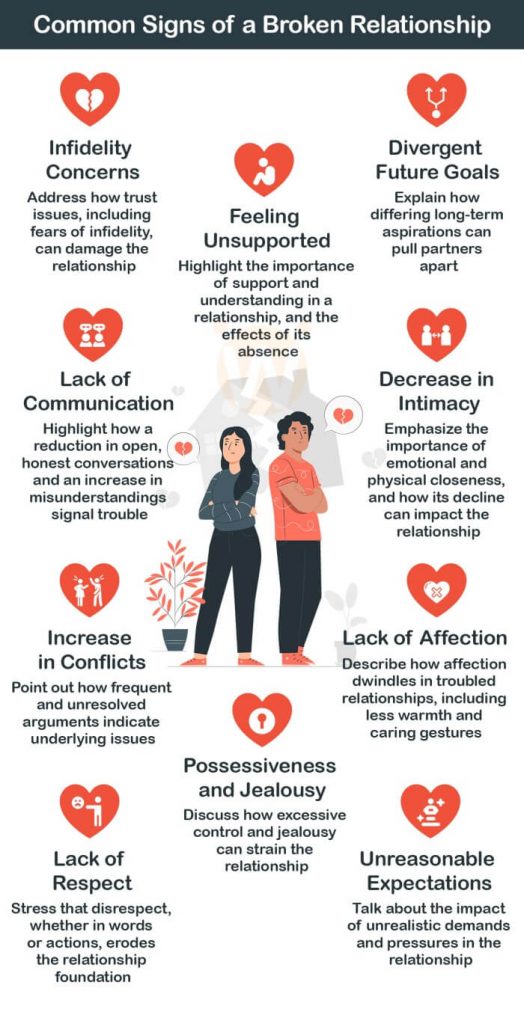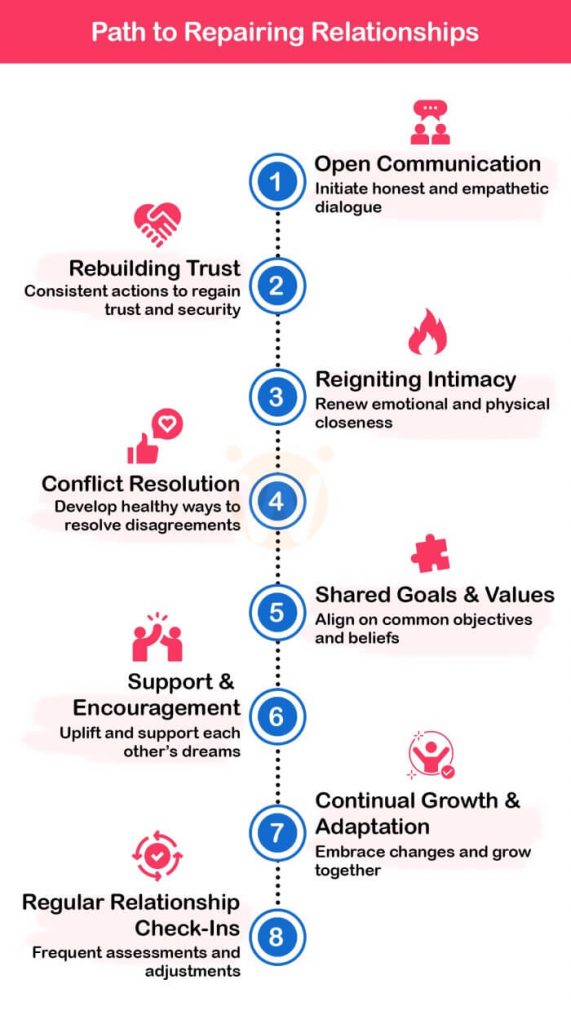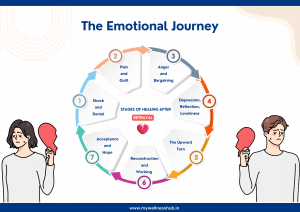Key Signs of a Broken Relationship
By Prapoorna M
Last Updated: February 8, 2023
In any relationship, understanding and addressing challenges early on is crucial. It’s often easy to overlook subtle signs of trouble, especially when life gets busy or we’re deeply invested in our partnerships. However, recognizing these signs is not just about identifying problems; it’s about taking proactive steps towards a healthier and more fulfilling relationship. Whether it’s a romantic partnership, a close friendship, or a familial bond, being aware of potential issues can make a significant difference.
Think of a relationship as a garden. Just as a garden needs regular care, watering, and sunlight, relationships require attention, communication, and nurturing. When neglected, just like plants wilting, relationships too can start showing signs of distress. Sometimes, it’s the little things – a decrease in communication, a feeling of distance, or a lack of effort from one or both sides. These might seem minor initially, but they can be early indicators of deeper issues that, if addressed promptly, can prevent the relationship from deteriorating further.

This article aims to shine a light on these signs, helping you understand them better. Knowing what to look out for is the first step in either mending the bond or making important decisions about your future. Remember, acknowledging that there are problems doesn’t mean the relationship is doomed. In many cases, it’s quite the opposite. It shows a willingness to work towards improvement, which is a cornerstone of any strong and lasting relationship. So, let’s explore these signs together and understand what they might mean for you and your relationship.
Recognizing the Signs of a Broken Relationship
1. Lack of affection:
Emotional and Physical affections are an essential part of any relationship. When partners stop showing affection, it can be a sign that something is wrong. It creates a disturbance where the affection is not as strong anymore or as it used to be. If there is no more communication, no problems can be solved, and the closeness to the other person is lost more and more when the relationship is built on affection and when there is a sudden disappearance in that – a clear sign that the relationship is ending without any future in it.
2. Lack of effort:
Reality is not like a fairy tale where happy and long-lasting relationships just don’t happen easily. It takes a lot of effort. Relationships require effort from both partners. When one partner stops making an effort, it will eventually show you. You can sense that something is wrong, and the partner resists holding the responsibility of dealing with it, which can be a sign that the relationship might be in trouble. This can lead to a need for more emotional connection.
3. Decrease in intimacy
Emotional and Physical intimacy is integral to any healthy relationship. Being intimate is a challenging thing in a relationship. It requires a strong foundation of trust and love. When partners start avoiding physical contact or stop being intimate, it can be a sign that something is wrong. It takes a lot of time to build intimacy, but when you don’t, then the survival in the relationship becomes slim.

4. Lack of communication:
The most common sign of a broken relationship is a lack of communication. When partners stop talking to each other or avoid discussing important issues, it can indicate that something is wrong. When partners have poor communication, they often feel unsafe and disconnected. This can lead to misunderstandings, resentment, and, ultimately, relationship breakdown.

5. Increase in conflicts:
All relationships have some level of competition. If partners are constantly arguing and fighting over something for a long time, it can indicate that the relationship is in trouble. Conflict is a regular part of the relationship; it can make a bond stronger or weaken it. But when the arguments become heated, it can lead to resentment and communication breakdown.
6. Possessiveness:
Possessiveness can be unhealthy in a relationship. If one partner becomes overly controlling or jealous, it can signify that they don’t trust you and feel threatened. A possessive partner only cares about how you can make them happy but doesn’t seem to realize that they have to make you happy too. Blackmailing, Having control over you, and Getting irritated at what you say are the major signs of possessiveness which might cause problems in the relationship.
7. No support:
In spite of having a partner some might still feel unloved and lonely. Which is because of lack of support. Partners should be each other’s biggest supporters. When one partner stops providing emotional support, the other one might feel insecure about the current issue, and it’s a sign that something is wrong with them.
8. Infidelity:
Infidelity is a serious issue that can significantly damage a relationship. When one partner has an affair, it can lead to feelings of betrayal, anger, and hurt, which can cause irreparable harm to the relationship.

9. Different opinions:
Opinions play a crucial role in our lives. Partners’ different views can lead to conflict and a relationship breakdown. This can cause partners to question their compatibility. One should respect the opinion of the other in a relationship. If they don’t, then it is a sign of a bad relationship.
10. Resentment:
Resentment is a common issue in broken relationships. When partners hold grudges or resent each other for past mistakes, it can lead to feelings of anger and hurt. This can cause partners to question the future of the relationship.
11. Lack of respect:
Pointing out your flaws, Disrespecting your privacy, Not valuing your opinions and lying to you are the signs of a lack of respect. Respect is essential in any relationship. When a partner is rude and arrogant and doesn’t accept your likes and dislikes, it signifies that they don’t respect who you are and your choices.
12. Unreasonable Expectations:
Unreasonable expectations can be a sign that your partner is trying to have control over you. And is expecting you to change in order to make them happy, or if they have unrealistic expectations of what you can do for them, it’s time to reevaluate your relationship.
13. Discussing important issues with other people:
When a partner loses their self-confidence in their relationship. They tend to discuss it with other people. Because every human being wants to share about themselves, this reason can lead to fierce fights if they stop sharing important things about their life.
14. Finding no future in the relationship:
Do you have the feeling that your ideas of how the next few years should go don’t fit together, and you don’t feel comfortable with it? These thoughts can be the first warning signs that your relationship will probably not go well for much longer. After all, anyone who restricts themselves in fundamental life issues due to a partnership will not be happy in the long term and will also not be able to lead a happy relationship.
15. Long Distance:
In a long-distance relationship, there are more chances to seek distraction and avoid making efforts. Conversations between them become less because of their time shifts in different countries or states. Emotional connection and the importance of sharing their things with their partner decreases vanish. You might feel insecure because of it
Comparing Healthy vs. Unhealthy Relationship Traits
| Traits | Healthy Indicators | Unhealthy Indicators |
|---|---|---|
| Communication | Open, honest, and empathetic dialogue; active listening. | Silence or yelling; passive-aggressiveness; avoiding discussions. |
| Trust | Mutual confidence in each other’s fidelity and integrity; feeling secure. | Suspicion without basis; excessive jealousy; constant monitoring. |
| Respect | Valuing each other’s opinions and feelings; appreciating differences. | Disrespect or contempt; belittling or mocking each other. |
| Conflict Resolution | Constructive discussions; seeking solutions that satisfy both. | Frequent arguments; unresolved conflicts; blame game. |
| Emotional Support | Being there for each other; understanding and compassion. | Indifference to partner’s feelings; lack of empathy. |
| Intimacy | Comfortable physical and emotional closeness; mutual desire. | Lack of physical or emotional connection; feeling pressured or ignored. |
| Personal Space | Respecting individual time and interests; encouraging independence. | Clinginess; lack of individual interests; dependency. |
| Expectations | Realistic and communicated clearly; flexibility and understanding. | Unrealistic or unspoken demands; inflexibility. |
Deciding Between Fixing and Ending the Relationship
Evaluating the Willingness to Change
Change is the lifeblood of growth, not just in our personal lives but also in our relationships. When facing relationship troubles, it’s essential to ask, “Are we both open to change?” This isn’t about changing who we are at our core, but rather about adapting behaviors or attitudes that may be harming the relationship. It’s like adjusting the sails on a boat to move forward effectively. If both partners are willing to make these adjustments, there’s a strong foundation for repair. However, when one or both partners are resistant to change, it can be like rowing a boat in opposite directions. This resistance is often a sign that it might be time to reevaluate the future of the relationship. Recognizing and accepting this can be challenging, but it’s a crucial step in ensuring both partners’ happiness and fulfillment, whether together or apart.
Seeking Professional Help
Sometimes, love alone isn’t enough to navigate through the complexities of a relationship. This is where professional help, like couple’s therapy or individual counseling, can be invaluable. Think of it as seeking a guide when you’re lost in unfamiliar terrain. A therapist can provide a neutral perspective and offer strategies and tools to improve communication, resolve conflicts, and rebuild trust. Therapy isn’t an admission of failure; rather, it’s a proactive step towards healing and understanding each other better. It’s about investing in the health and future of your relationship.
Understanding When to Let Go
Letting go of a relationship is never easy, but sometimes it’s the healthiest option. Recognizing when a relationship has run its course requires honesty and courage. If the relationship causes more pain than joy, if the same issues keep resurfacing despite your best efforts, or if you find that your values and paths in life have diverged significantly, these might be signs that it’s time to let go. This decision isn’t about giving up; it’s about acknowledging that everyone deserves a relationship where they feel valued, understood, and happy.
Relationship Ends: The Need for Divorce Counseling
Boost your self-esteem after a breakup
Balancing Efforts and Individual Well-being
In the journey of fixing a relationship, it’s crucial not to lose sight of your own well-being. A relationship should be a source of support and happiness, not a constant drain on your energy and emotions. It’s important to balance the effort you put into the relationship with taking care of your own needs. This balance can look different for everyone. It might mean setting boundaries, spending time on your own hobbies and interests, or even seeking individual therapy. Remember, you cannot pour from an empty cup. Taking care of your well-being is not just good for you, but it also puts you in a better position to contribute positively to your relationship.
In conclusion, deciding whether to fix or end a relationship is a deeply personal and sometimes painful journey. It requires honesty, self-reflection, and sometimes the courage to make tough decisions. Whether the path leads to repairing the relationship or parting ways, what matters most is that it leads to a healthier, happier you.
Steps to Repairing a Broken Relationship

Open and Honest Communication
The cornerstone of any strong relationship is open and honest communication. It’s like opening the windows in a stuffy room – it brings in fresh air and clarity. Start by creating a safe space where both partners feel heard and respected. Share your feelings, fears, and expectations without blame or judgment. It’s equally important to be a good listener. When your partner speaks, listen not just to respond, but to understand. Sometimes, the mere act of being heard can begin to heal wounds. Remember, effective communication is a two-way street; it involves speaking your truth and being open to hearing your partner’s perspective.
Rebuilding Trust
Trust is like a fragile vase; once broken, it takes time and care to put the pieces back together. Rebuilding trust starts with small, consistent actions. Be reliable; do what you say you’re going to do. Practice transparency in your actions and conversations. If mistakes were made, acknowledge them and show genuine remorse. Trust also involves giving your partner the benefit of the doubt. This process is slow and requires patience, but each small step towards trust is a leap towards a stronger relationship.
Reigniting Intimacy
Intimacy is more than just physical closeness; it’s about creating a deep emotional connection. Start by spending quality time together. Engage in activities that both of you enjoy, or explore new interests together. Small gestures of affection, like a surprise note or a spontaneous hug, can also reignite the spark. On a physical level, try to be more affectionate – hold hands, cuddle, or plan intimate moments. Remember, intimacy is about feeling close to each other, both emotionally and physically.
Setting Realistic Expectations
Every relationship has its ups and downs, and it’s important to set realistic expectations. Understand that no one is perfect; we all have our strengths and weaknesses. Acknowledge and accept these differences in each other. It’s also vital to understand that some problems don’t have immediate solutions and that’s okay. Setting realistic expectations is about knowing that while not every day will be perfect, you’re both committed to working through the challenges together.
Regular Check-ins and Adjustments
Just like a car needs regular maintenance, relationships also need regular check-ins. Set aside time to discuss the health of your relationship. Are your needs being met? Are there unresolved issues that need addressing? This is also a time to celebrate achievements and acknowledge progress. Be open to making adjustments. What worked at the beginning of your relationship might not work now, and that’s normal. Regular check-ins and adjustments ensure that your relationship continues to grow and evolve in a healthy way.
Relationship Check-in Guide
| Check-in Points | Questions to Consider |
|---|---|
| Emotional Needs | Are our emotional needs being met? How do we feel about our emotional connection currently? |
| Personal Growth | Are we growing individually and together? What have we learned about ourselves and each other lately? |
| Future Goals | Do our future plans and goals align? Are there any new aspirations or changes we should discuss? |
| Communication Quality | How effectively are we communicating? Are there any unresolved issues or topics we need to address? |
| Trust and Security | Do we feel secure and trusting in our relationship? How can we strengthen our trust? |
| Conflict Resolution | How do we handle disagreements? Are there healthier ways we can resolve conflicts? |
| Support and Encouragement | How well do we support each other’s goals and dreams? Is there more we can do to encourage each other? |
| Intimacy and Affection | Are we satisfied with the level of intimacy and affection in our relationship? What changes, if any, would we like to see? |
| Work-Life Balance | How are we balancing our relationship with other responsibilities? Do we need to make adjustments to better support each other? |
| Shared Activities and Interests | Are we spending quality time together? What activities or interests would we like to explore or continue? |
In conclusion, repairing a broken relationship is a journey that requires effort, patience, and a lot of love. It’s about building a bridge, plank by plank, towards a future where both partners feel valued, understood, and deeply connected. Remember, the most beautiful bridges are often the ones that have weathered the most storms.
Conclusion
As we reach the end of our journey through understanding and addressing relationship issues, it’s important to reflect on what we’ve learned. Recognizing the signs of trouble in a relationship isn’t just about identifying what’s wrong; it’s about opening a door to a better, more fulfilling partnership. Whether it’s about improving communication, rebuilding trust, or reigniting intimacy, each step taken is a step towards a stronger bond.
Remember, acknowledging issues in a relationship is not a sign of failure. Instead, it’s a brave and honest act of striving for a healthier connection with your partner. It’s about facing challenges head-on and choosing to work towards a solution. This journey might require tough decisions, and sometimes, the healthiest option might be to part ways. But more often, with effort and understanding, many relationships can find a new, more resilient path forward.
Your relationship is an integral part of your life, and it deserves attention and care. By being proactive and engaged, you’re not just improving your relationship; you’re also enriching your own life. A healthy relationship brings joy, support, and a sense of companionship, all of which contribute to overall well-being.
So, take these insights and use them as tools for nurturing your relationships. Whether you’re working to mend a bond or deciding to start afresh, know that you have the strength and wisdom to make the best choices for your happiness. Remember, every relationship is a journey, and it’s the lessons we learn and the love we share that make it worthwhile.
Not sure if your relationship deserves another chance? A professional consultation with WellnessHub coaches can help you!
Frequently asked questions for “Key Signs of a Broken Relationship”
1. How can I tell if the lack of communication in my relationship is just a phase or a sign of a deeper problem?
Temporary lapses in communication can happen due to stress or other life events. However, if the lack of communication persists and leads to misunderstandings or feelings of disconnection, it may indicate a deeper problem that needs addressing.
2. Is constant arguing in a relationship always a bad sign?
While occasional arguments are normal, constant and unresolved conflicts can be harmful. It’s crucial to understand the reasons behind these arguments and whether they lead to constructive solutions or further resentment.
3. What should I do if I feel my partner is too possessive or controlling?
Possessiveness and controlling behavior can be damaging to a relationship. It’s important to communicate your feelings to your partner and consider professional help if the behavior continues.
4. Can a relationship recover from infidelity?
Recovery from infidelity is challenging and depends on factors like the willingness to forgive, rebuild trust, and commitment to the relationship from both partners. Counseling can play a vital role in this process.
5. How do I approach my partner about seeking professional help for our relationship?
Approach the topic gently, focusing on the desire to improve and strengthen your relationship. Emphasize that seeking help is a positive step and a sign of commitment to each other.
6. How often should we have check-ins about our relationship’s health?
Regular check-ins are healthy, but the frequency can vary based on individual needs. Some couples benefit from weekly discussions, while others may find monthly check-ins sufficient.
7. What are some ways to reignite intimacy in our relationship?
Reigniting intimacy can involve spending quality time together, engaging in activities you both enjoy, showing physical affection, and openly discussing your emotional and physical needs.
8. Is it normal to have doubts about a relationship?
Yes, it’s normal to have doubts occasionally. However, if doubts are persistent and cause distress, it may be important to explore their root causes and address any underlying issues.
9. How do we set realistic expectations in our relationship?
Communicate openly about your needs and limitations, and be willing to listen and understand your partner’s perspective. Acknowledge that change takes time and effort from both sides.
10. Can a relationship still be successful even if we have different opinions and interests?
Yes, a successful relationship can accommodate different opinions and interests. It’s about respecting each other’s perspectives and finding common ground or mutual respect for individual differences.
About the Author:
Prapoorna Mangalampalli, Psychologist
Prapoorna, an author with dual master’s degrees in Psychology and English, excels in exploring and enhancing human experiences. Her writing, characterized by deep empathy and insight, primarily focuses on the complexities of counseling, spanning areas such as online, marital, relationship, child, family, and career counseling. Specialized training in various counseling sectors underscores her dedication to positive change. In her blogs, Prapoorna offers valuable guidance and a unique perspective for parents of children with Autism and special needs, creating a supportive community in this realm.
Book your Free Consultation Today
Parent/Caregiver Info:
Client’s Details:
* Error Message









